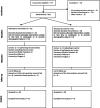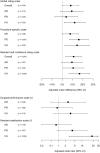Procedure-specific simulation for vaginal surgery training: A randomized controlled trial
- PMID: 38382912
- PMCID: PMC11103140
- DOI: 10.1111/aogs.14810
Procedure-specific simulation for vaginal surgery training: A randomized controlled trial
Abstract
Introduction: Vaginal surgery has a superior outcome profile compared with other surgical routes, yet skills are declining because of low case volumes. Graduating residents' confidence and preparedness for vaginal surgery has plummeted in the past decade. The objective of the present study was to investigate whether procedure-specific simulation skills, vs usual training, result in improved operative competence.
Material and methods: We completed a randomized controlled trial of didactic and procedural training via low fidelity vaginal surgery models for anterior repair, posterior repair (PR), vaginal hysterectomy (VH), recruiting novice gynecology residents at three academic centers. We evaluated performance via global rating scale (GRS) in the real operating room and for corresponding procedures by attending surgeon blinded to group. Prespecified secondary outcomes included procedural steps knowledge, overall performance, satisfaction, self-confidence and intraoperative parameters. A priori sample size estimated 50 residents (20% absolute difference in GRS score, 25% SD, 80% power, alpha 0.05).
Clinicaltrials: gov: Registration no. NCT05887570.
Results: We randomized 83 residents to intervention or control and 55 completed the trial (2011-23). Baseline characteristics were similar, except for more fourth-year control residents. After adjustment of confounders (age, level, baseline knowledge), GRS scores showed significant differences overall (mean difference 8.2; 95% confidence interval [CI]: 0.2-16.1; p = 0.044) and for VH (mean difference 12.0; 95% CI: 1.8-22.3; p = 0.02). The intervention group had significantly higher procedural steps knowledge and self-confidence for VH and/or PR (p < 0.05, adjusted analysis). Estimated blood loss, operative time and complications were similar between groups.
Conclusions: Compared to usual training, procedure-specific didactic and low fidelity simulation modules for vaginal surgery resulted in significant improvements in operative performance and several other skill parameters.
Keywords: gynecologic surgery; low fidelity simulation; surgical education; vaginal hysterectomy.
© 2024 The Authors. Acta Obstetricia et Gynecologica Scandinavica published by John Wiley & Sons Ltd on behalf of Nordic Federation of Societies of Obstetrics and Gynecology (NFOG).
Conflict of interest statement
Geoffrey W. Cundiff received royalties as first author from Wolters Kluwer for TeLinde's Atlas of Gynecologic Surgery and had unpaid leadership roles as Past President and Board Member (American Urogynecologic Society), International Advisory Board Member, (International Urogynecologic Association). Geoffrey W. Cundiff, Catherine Flood and Roxana Geoffrion had unpaid leadership roles as Board Members (Canadian Society of Pelvic Medicine). All other authors have no relevant disclosures.
Figures



References
-
- Accessed May 26, 2023. https://www.acgme.org/globalassets/pfassets/programresources/obgyncaselo...
-
- Hall EF, Raker CA, Hampton BS. Variability in gynecologic case volume of obstetrician‐gynecologist residents graduating from 2009 to 2017. Am J Obstet Gynecol. 2020;222:617.e1‐617.e8. - PubMed
-
- Banks E, Gressel G, George K, Woodland M. Resident and program director confidence in resident surgical preparedness in obstetrics and gynecologic training programs. Obstet Gynecol. 2020;136:369‐376. - PubMed
-
- Guntupalli SR, Doo DW, Guy M, et al. Preparedness of obstetrics and gynecology residents for fellowship training. Obstet Gynecol. 2015;126:559‐568. - PubMed
-
- Geoffrion R, Choi JW, Lentz GM. Training surgical residents: the current Canadian perspective. J Surg Educ. 2011;68:547‐559. - PubMed
Publication types
MeSH terms
Associated data
Grants and funding
LinkOut - more resources
Full Text Sources
Medical
Research Materials
Miscellaneous

